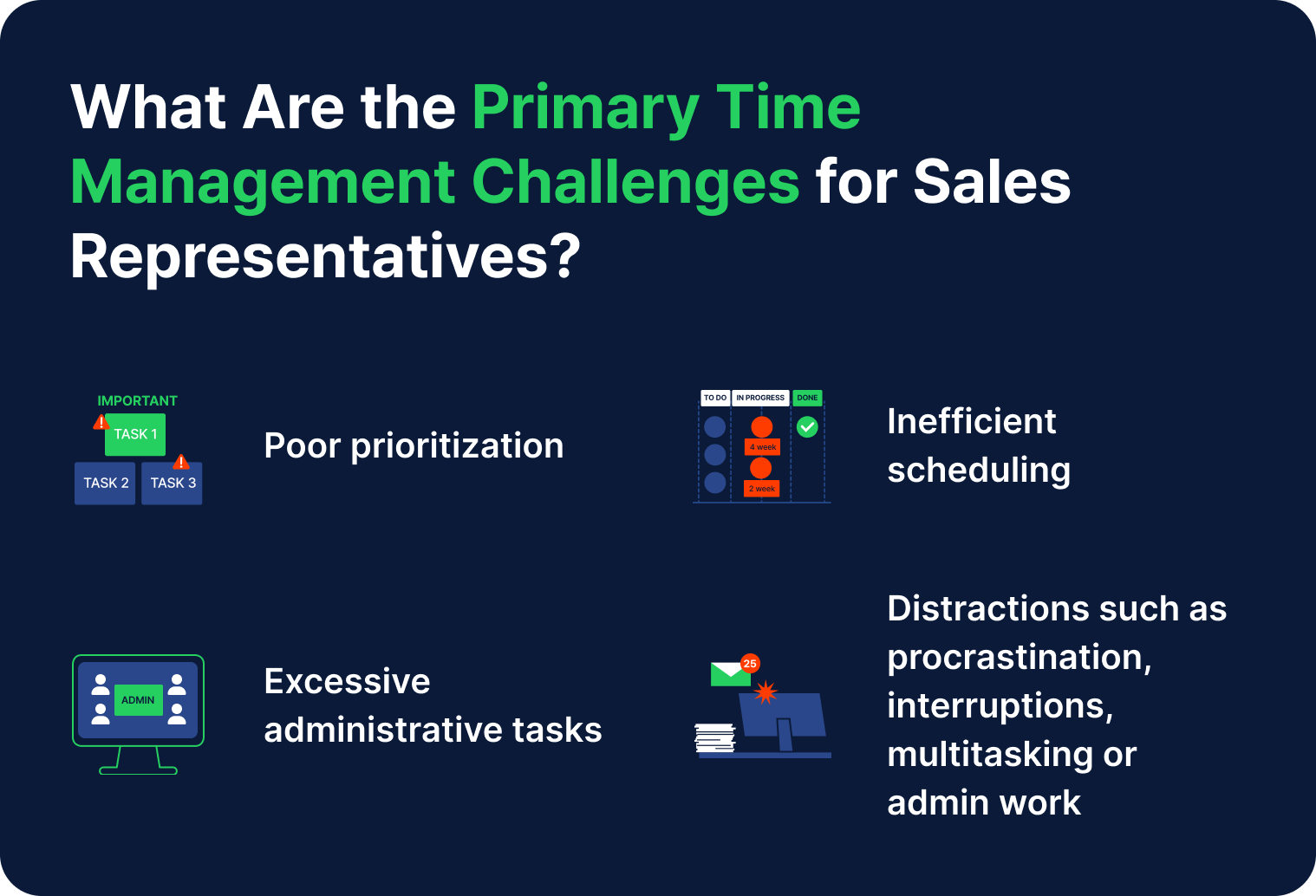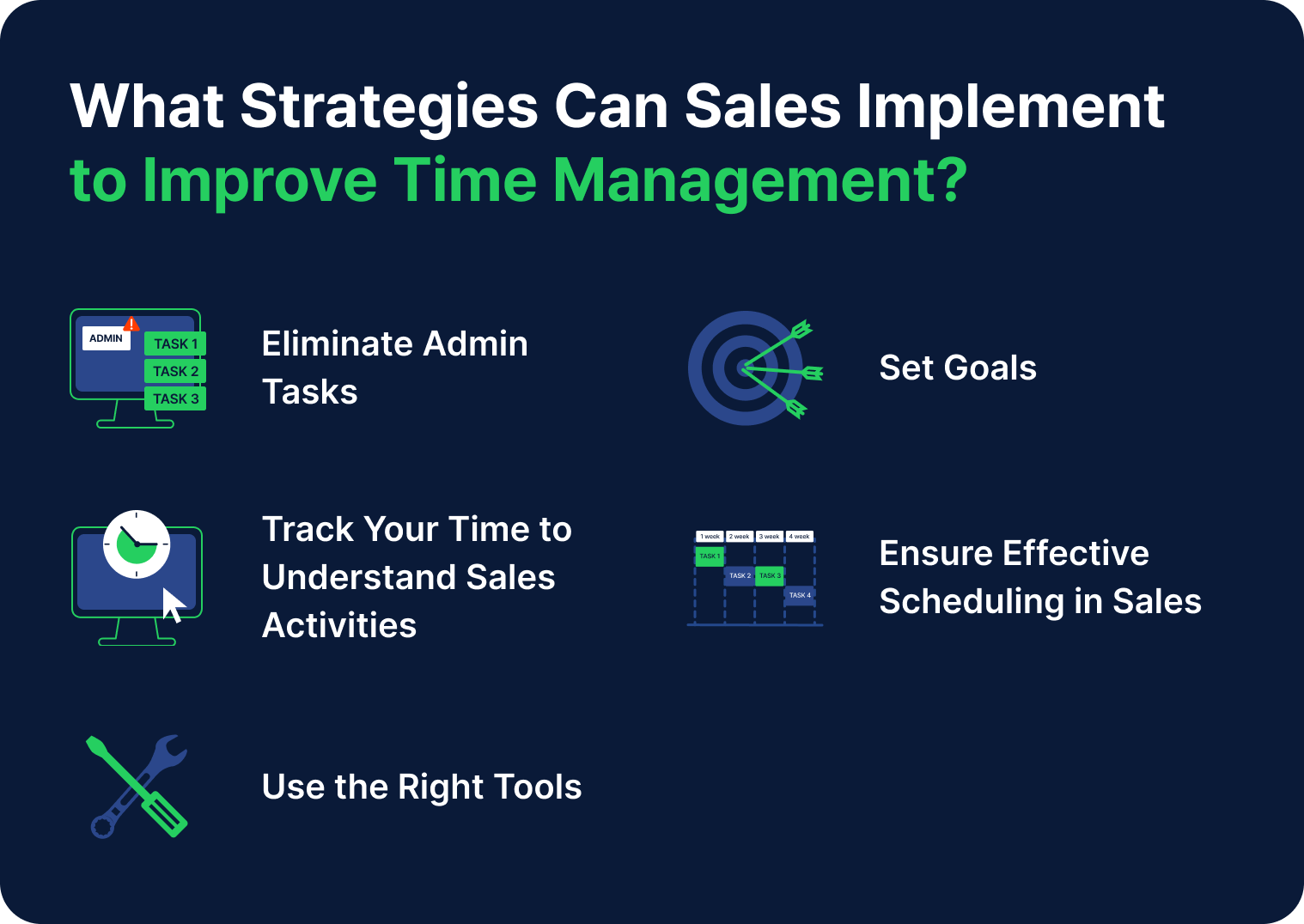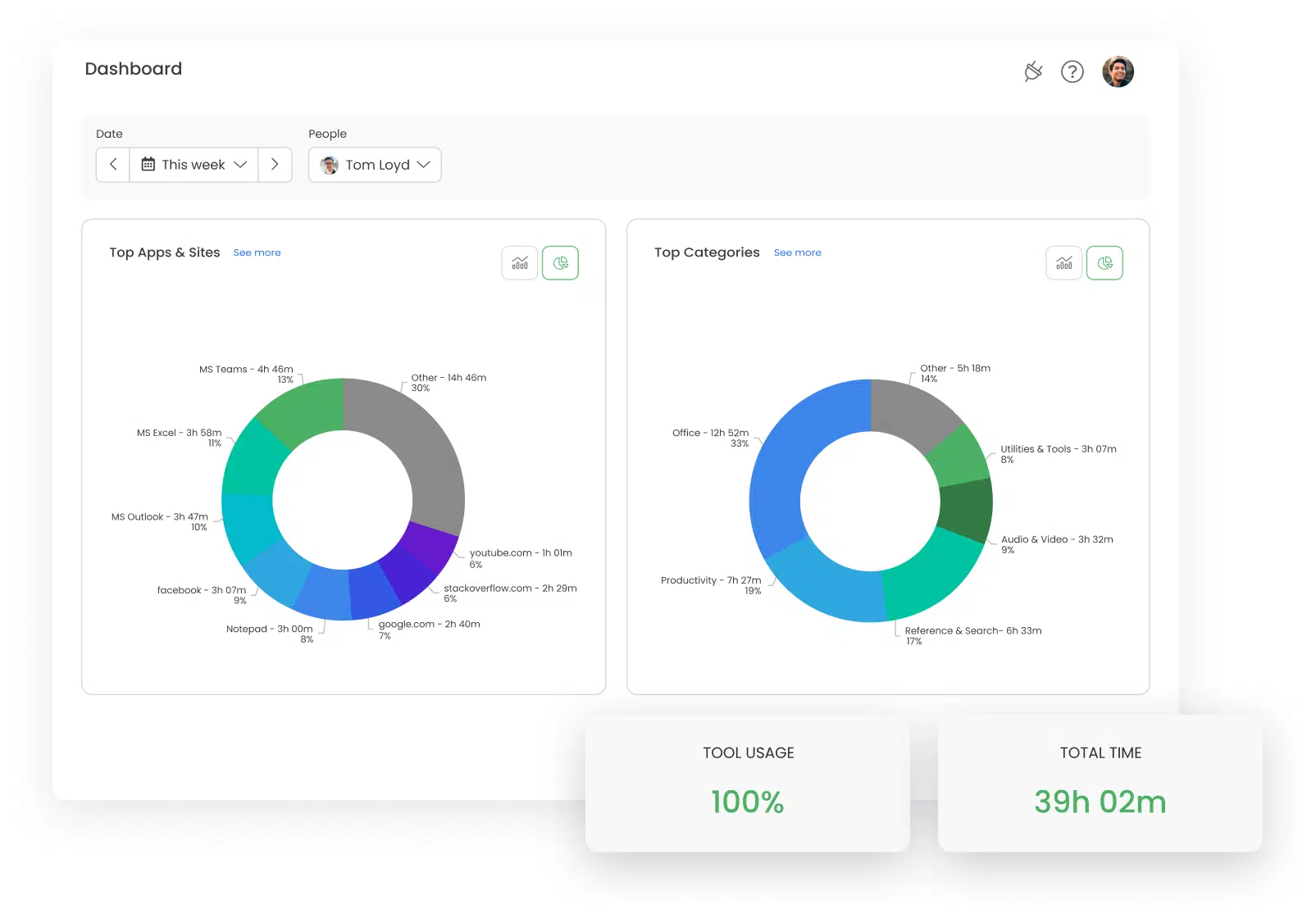Why Sales Reps Struggle with Time Management (And How to Fix It)
-
Kate Borucka
- March 19, 2025
- 8 min read

Sales time management can be challenging as it requires orchestrating different activities into a coherent action plan and ensuring all tasks are prioritized effectively to maximize productivity, meet targets, and maintain strong customer relationships.
It’s not an easy thing to effectively manage the whole sales process. You need to ensure that every stage, from prospecting to closing deals, runs smoothly while balancing client needs, deadlines, and revenue goals. That requires lots of effort and great time management skills.
Here’s your short guide on how to improve time management for sales reps.
What Are the Primary Time Management Challenges for Sales Representatives?
According to the Salesforce report, Sales leaders and managers say their top challenge is changing customer needs and expectations (for example, demanding lower costs, deeper understanding, and greater value). This requires sales reps to constantly adapt to changing environment.
Hence, sales professionals are always busy. And that can make time management even more challenging.
Here are the the four main time management challenges for sales people:

- Poor prioritization. It can be difficult to choose the most important tasks from your to-do list. This can lead to time spent on less impactful activities.
- Excessive administrative tasks. Statistics show that less than 30% of a sales rep’s time is spent selling; the rest goes to admin and other non-revenue related activities.
- Inefficient scheduling. Without a structured schedule, sales reps may find themselves reacting to events rather than proactively managing their time.
- Distractions. Procrastination, interruptions, multitasking, or admin work, can lead to mental overload and lower sales efficiency.
How Does Ineffective Time Management Impact Sales Performance?
Ineffective time management often means sales reps spend less time on actual selling, with studies showing they typically dedicate only about 35% of their time to customer engagement. This, unfortunately, is a common phenomenon in the sales world—salespeople often complain about the amount of administrative work.
Here’s what happens when time management in sales isn’t the priority:
- Missed opportunities: Failing to follow up on leads or meet deadlines can result in lost sales and give competitors an edge.
- Lower revenue: Less efficient use of time directly cuts into revenue potential as fewer deals are completed.
- Damaged customer relationships: Delays or lack of responsiveness can erode trust and satisfaction with clients.
- Increased stress and burnout: Poor planning piles on pressure, reducing productivity and focus.
- Decreased motivation: Overwhelm and missed targets can sap morale, creating a cycle of underperformance.
- High turnover rate: When sales struggle with managing their time, it causes elevated turnover rates because they’re not able to keep up with the demands.
These effects collectively hinder both individual and team sales success.
What Strategies Can Sales Implement to Improve Time Management?
Effective salespeople know how to manage time. After all, it’s not only about making sales calls. It’s about how you plan and organize your work. Even the best sales techniques won’t work if you don’t know how to manage your time.
Check out the most effective and proven time management tips that will boost your sales career.

Eliminate Admin Tasks
Since admin work takes over 30% of many sales reps time, it’s a good idea to shift focus onto work that really matters. Hence, your sales strategy shouldn’t be focused only on creating perfect sales cycles, but above all—using the time effectively.
Eliminating administrative tasks will improve engagement in activities that bring real value to the sales funnel and administrative work isn’t one of them. It’s required, of course, but filling out timesheets, developing sales reports, updating sales and customer records, checking data accuracy in invoices and orders is time consuming and adds more work.
Incorporate work automation and use tools that will help you optimize processes. For example, Salesmate will automate repeatable tasks, bring your sales teams into one platform, and improve sales results.
Track Your Time to Understand Sales Activities
Tracking time provides insight into your daily activities, highlighting how much time is spent on tasks that don’t directly contribute to sales success (non-essential tasks).
In sales, the most critical tasks are those that drive results, such as engaging with potential customers, following up on leads, or closing deals.
By identifying and reducing time spent on non-essential tasks, you can shift your focus to what matters most, optimizing your schedule for better sales performance.
The right time tracker for sales, such as TimeCamp, can help you track time and improve time management. Sign up today and transform your sales process! Get started with TimeCamp’s time tracker for sales now and see the difference it makes.
Set Goals
To achieve sales targets effectively, you need to know your priorities. For goal setting in sales, the SMART method can be helpful:
For example, a complete SMART goal might look like this:
Increase monthly sales revenue (specific) by 15% (measurable) within the next quarter (time-bound), ensuring it aligns with our company’s growth strategy (relevant) and is achievable with current team resources (achievable).
This approach not only clarifies what you’re aiming for but also boosts your chances of success by keeping your goals practical and purpose-driven.
Also, for larger targets, break them into smaller tasks to make them more achievable.
Ensure Effective Scheduling in Sales
Many salespeople fail to organize their agenda. The day of a sales rep can be unexpected, and while it can be difficult to fit all the planned activities into your schedule, it’s important to plan your work. That way, you’ll know what to expect and how to arrange your day.
Since the work of sales agents very often may be more than just doing cold calls or reaching out to clients, e.g., working with marketing and other departments, the red tape, it requires coordinating many efforts.
What are some best practices for scheduling and planning in sales? Effective scheduling involves spending time each day to plan workday and smartly schedule meetings, setting reminders to stay organized and focused, and using such time management techniques as time batching (grouping similar tasks together reduces context switching and increases efficiency) to keep things well-organized.
Use the Right Tools
Using the right tools can help to create a unique sales process tailored to your preferences and style of work. There are threee types of automation tools that you can especially benefit from.
- CRM system. Help is customer relationship management, tracking activities and interactions efficiently, managing your sales pipeline with clear deadlines, and providing mobile access to keep everything organized on the go. All while offering customizable workflows and insightful analytics.
- Time tracking software. Helps to track time and spot areas for improvement.
- Project management software. Allows you to easily organize all work in one platform and track progress to projects. It also serves as a centralized place for communication for all team members.
You can also use other tools for sales that will help you manage time better to integrate them with your current systems.
How Can TimeCamp Assist Sales in Managing Time More Effectively?
It would be a sin not to mention time tracking when talking about time management. With the rise of remote work, sales organizations are adopting these tools to monitor remote work and optimize performance.

TimeCamp offers features designed to enhance time management for sales professionals:
Automatic Time Tracking
The FLSA imposes some formalities on sales environment which makes it necessary to perform administrative work (which takes a lot of time). Because salespeople are required by law to track their time, you’ll need an effective time tracker to log work hours accurately.
TimeCamp automatically tracks time spent on work and records all work hours and activities. You have it all in neat timesheets with precise time logs up to the second. You can track overtime, vacation, leaves, and other types of attendance.
What’s more, by automatically recording time spent on various tasks, you gain insights into work patterns and can identify areas for improvement.
Detailed Reporting
TimeCamp provides comprehensive reports that help sales reps analyze their productivity and adjust their strategies accordingly.
Reporting is important to track progress and see whether you’re focusing primarily on top-priority daily tasks that drive sales revenue.
In TimeCamp, you can choose from different types of reports: time reports (by people, day, projects, summary), finance reports (with billable and non-billable hours, and estimates), computer activities (productive and non-productive activities, usage of websites and apps, away time, or goals tracked), and custom reports.
That way, you can easily use reporting to analyze work and better manage time to achieve higher conversion rates in sales.

Take your sales to the next level with TimeCamp – time tracker for sales reps – try it free! 🚀
Integration with Other Tools
Seamless integration with other applications ensures that time tracking aligns with existing workflows, minimizing disruptions.
By connecting with CRM tools like Salesforce or HubSpot, TimeCamp automatically logs time spent on customer interactions, emails, and calls, eliminating manual data entry and reducing errors. Its integration with project management platforms such as Trello or Asana allows sales reps to track time on specific tasks effortlessly, providing real-time insights into time allocation.
This automation cuts down on administrative and organizational tasks, while detailed reporting features help managers optimize workflows and improve efficiency, enabling the team to focus more on selling and less on paperwork.
Check all TimeCamp integrations and choose your favorite tools to better manage time!
How Can Sales Managers Support Their Teams in Improving Time Management?
As a manager, you can do a lot to support your sales team. Here are a few tips that will help you and your people improve managing time:
- First and foremost, delegating or automating routine administrative tasks. This allows sales reps to concentrate on activities directly contributing to sales, thereby enhancing productivity.
- Encourage scheduling of multiple prospect meetings. This allows for more focused and productive interactions with existing clients. Example: Imagine a salesperson who needs to meet with three prospects and handle client calls in a single day. By scheduling the prospect meetings back-to-back from 9 AM to 11 AM, they can prepare for all three at once, complete them efficiently, and then dedicate the afternoon to client interactions without interruptions.
- Focus your efforts on high-priority activities that bring the highest revenues and open possibilities for future growth.
- Implement time management strategies tailored to personal preferences.
- Use templates for email and contracts to save time on drafting.
- Implement supportive tools that helped to automate repetitive, manual tasks for better efficiency.
- Offer free sales training (you can choose from many different offers tailored to specific needs) to encourage your team’s growth and strengthen their sales skills and ensure continuous improvement.
Conclusion: Sales Time Management Will Skyrocket Your Productivity
One of the biggest problems in sales is spending time on unnecessary work. Sales representatives who dedicate more time to tasks directly tied to selling tend to experience higher levels of job satisfaction.
If you make your team’s experience smooth and let them focus on their work, you’ll notice a significant improvement in lead generation. Using the right tools along with the right strategies will elevate your time management.
Boost your sales productivity and stop wasting time on manual tracking—start using TimeCamp for free today!
Sources:
Salesforce. “15 Sales Statistics That Prove Sales Is Changing.” Salesforce Blog, June 18, 2021. https://www.salesforce.com/blog/15-sales-statistics/.
Spotio. “The Ultimate List of Sales Statistics [2024 Edition].” Spotio Blog, January 8, 2024. https://spotio.com/blog/sales-statistics/#salesproductivity.
U.S. Department of Labor. “Fact Sheet #17F: Exemption for Outside Sales Employees Under the Fair Labor Standards Act (FLSA).” Wage and Hour Division, revised July 2008. https://www.dol.gov/agencies/whd/fact-sheets/17f-overtime-outside-sales.


